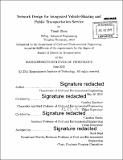Network design for integrated vehicle-sharing and public transportation service
Author(s)
Zhou, Tianli, Ph. D. Massachusetts Institute of Technology
DownloadFull printable version (7.435Mb)
Other Contributors
Massachusetts Institute of Technology. Department of Civil and Environmental Engineering.
Advisor
Cynthia Barnhart and Carolina Osorio.
Terms of use
Metadata
Show full item recordAbstract
Vehicle sharing services have become a major urban transportation mode. One-way vehicle sharing service facilitates access to public transportation systems, thereby addressing the first and last mile challenges and creating an integrated vehicle-sharing and public transportation network providing origin-to-destination service. In this thesis we provide models and methods for design one-way vehicle-sharing networks. The location of one-way vehicle sharing stations strongly influence the level of travel time savings achieved by the users of the system. Our goal, then, is to select station locations so as to maximize the connectivity with the public transportation system, increase the accessibility to the urban area, reduce travel times, reduce congestion, and reduce emissions. We select a certain number of stations to install from a set of candidates whose locations are predetermined. In Chapter 2, we review existing literature in which the objective is to minimize total user travel cost. In Chapter 3, we propose a new model with the objective to design a network such that more users experience travel time savings that are sufficiently large to elicit mode shifts to the integrated public transportation option. We develop a decomposition procedure to solve our model and propose cut generation methods to expedite the solution process. Computational results in Chapter 4 show that our algorithm reduces solution times, while increasing the number of travelers who can experience travel time savings of significance by using our newly designed network. In Chapter 5, we propose a heuristic method to generate a network design with (near-) minimal total travel cost. Our decomposition method that searches in a neighborhood around the known best design, and changes the neighborhood center when improved solution are identified or expands the neighborhood if no better solution is found. Computational results show that our algorithm finds improved solutions, compared to existing approaches, for large-scale networks with imposed limits on computation time. In Chapter 6, we conclude the thesis and provide future research guidance.
Description
Thesis: S.M. in Transportation, Massachusetts Institute of Technology, Department of Civil and Environmental Engineering, 2015. Cataloged from PDF version of thesis. Includes bibliographical references (pages 81-83).
Date issued
2015Department
Massachusetts Institute of Technology. Department of Civil and Environmental EngineeringPublisher
Massachusetts Institute of Technology
Keywords
Civil and Environmental Engineering.